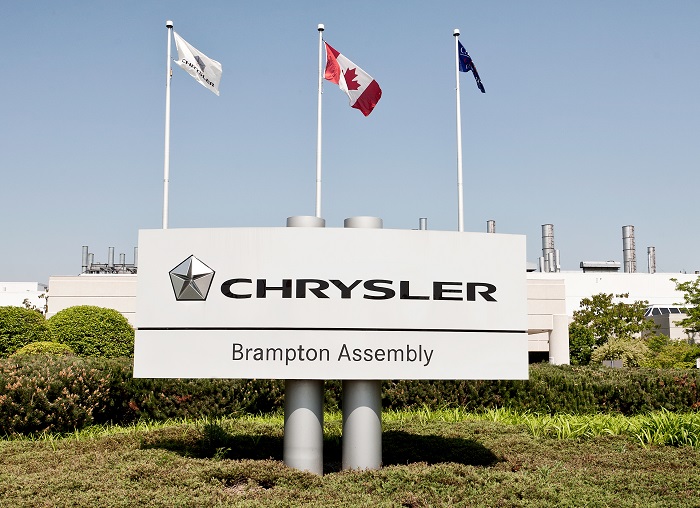President Trump has levied tariffs of 25% on all goods coming to the United States from Mexico and Canada, effective Tuesday. Canada has been America’s top ally since the mid-1800s; the two countries have been sending massive amounts of material back and forth over the border since the 1960s.

Stellantis has two major factories in Canada; one is currently down while the other makes minivans and Dodge Chargers. In the past, Canada had its own Chrysler engine factory, but this was shut down when domestic content requirements ended. In addition, all Hemi engines and Hurricane six-cylinders are made in Mexico, along with all Ram heavy duty pickups, Ram ProMasters, and the Jeep Wagoneer S and, soon, the Jeep Recon.
Automotive parts and cars are covered by the new tariffs, along with other major components FCA and Stellantis outsourced to Mexican companies. The Ram 1500 and Wagoneer both rely on Mexican engines; the Charger and minivans are made in Canada. The increases in costs for Stellantis come as cost pressure for its cars is increasing, and favor Hyundai and Kia, which import mainly from South Korea, and Mazda, which imports mainly from Japan.
Donald Trump had signed a trade deal with Mexico and Canada guaranteeing freedom from tariffs like these, in his first term. The US and Canada have a separate free trade agreement which is violated by the “sanctions.”

Stellantis could technically move production to the United States at the cost of billions of dollars, shutting down its just-renovated, state-of-the-art Windsor plant and the still-under-renovation Brampton plant; or it could simply shut down the minivans and future STLA Medium line, cutting back on United States investment until the country is on a more even keel, or it could sell the remains of Chrysler Corporation to a better capitalized rival.
The tariffs were allegedly for importing fentanyl, nearly all of which comes into the United States through major ports, and almost none of which comes in through Canada or Mexico. They include Mexican oil imports but the tariff on Canadian oil imports is lower, at 10%.
China, which Trump has cited as an enemy in many speeches, only has a 10% tariff. A representative of China’s government said they were taking their case to the World Trade Organization.
Prime Minister Justin Trudeau set up retaliatory tariffs of over $155 billion late on Saturday; $30 billion also starts up on Tuesday, and $125 billion starts in 21 days to give Canadian importers time to adjust and find other sources. His television address noted the deep historical bonds between the countries; he pointed out that Canada “didn’t ask for this.” Trudeau is targeting American beer, wine, and bourbon; fruits, vegetables, and juices; perfumes, clothing, shoes, appliances, sporting goods, and furniture, but so far not cars or trucks. Lumber and plastics are to face levies, and Canada may reduce American access to its minerals and other supplies.
Trump supporters on social media have lined up to support the tariffs, claiming Canada is at fault for allowing even tiny amounts of fentanyl to come in through the border, though stopping imports of drugs is in fact the job of U.S. Customs, which recently, like all federal agencies, told its employees to quit in return for possibly-imaginary compensation.

Other news that might affect Stellantis includes Elon Musk’s independent employees, who were neither elected nor hired by the government, taking over the United States’ human resources and payment systems. One immediate outcome of this was an email sent to every federal employee, telling them to quit now to get a compensation package that has not been cleared with federal authorities—the same message he sent to Twitter employees on taking over that company. Those who did resign never received compensation and are currently suing. Overall, the outcome for Stellantis is likely waiting longer for patents to be approved, but not having federal-level regulatory concerns for some time. A massive downsizing of the federal government would have major implications for the economy.
The head of the Consumer Financial Protection Bureau, which protects people who take out car loans, was fired last week as well though his five-year term has not yet expired and the agency is theoretically under the control of Congress rather than the President. This is likely to have a more tangential impact on Stellantis.

David Zatz started what was to become the world’s biggest, most comprehensive Mopar site in 1994 as he pursued a career in organizational research and change. After a chemo-induced break, during which he wrote car books covering Vipers, minivans, and Jeeps, he returned with Patrick Rall to create StellPower.com for daily news, and to set up MoTales for mo’ tales.
David Zatz has around 30 years of experience in covering Chrysler/Mopar news and history, and most recently wrote Century of Chrysler, a 100-year retrospective on the Chrysler marque.
Discover more from Stellpower - that Mopar news site
Subscribe to get the latest posts sent to your email.